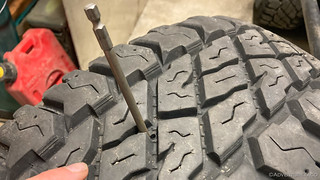
That's not right either. After running on this for two miles or so at 65mph, even though it looks pretty normal, the tire is toast.
TL;DR - I got my third Cooper ST/Maxx flat ever, all on the same set (my fourth) of tires. I still think they are one of the best tires out there.
I got another flat - this time the driver rear - as I was driving home on I-5 after a long trip to Death Valley. I'd been driving for approximately 20 hours when a fellow driver alerted me to the situation, only a few miles from home.
I find it strange that I've gotten two flats in my Cooper ST/Maxx in the last 4 months. Further, that they've both been on I-5 - as oppossed to on dirt roads - is also intriguing.
I also find it fantastic that SimpleTire has been so easy to deal with when getting insured replacements. Which brings me to the topic of tire certificates:
In general, I am not a fan of "additional insurance," or even really insurance in general (to the extent that it's optional), if it can be avoided. There are a lot of reasons for that, but the main one is this: If an insurance company is willing to sell me insurance (let me *definitely* give them some money, with the *possibility* that they might give me *some amount* - which could be more or less - in the future), then THEY are making the bet that they are going to come out on top. And, insurance companies have notoriously high profits (that's how Warren Buffet really made it).
So, generally, I don't like to play that game; rather, I like to "self insure," which is to say, bet that the vast majority of the time, I wont need the extra insurance, and save that money. If, every once in a while, I have to pay myself, then I have this "big pool of money that I've saved over time" (note, I don't actually set this money aside or anything, but I do have reasonably good financial habits, so I'm not without a cushion) that I can use to cover the cost. My bet is the same as the insurance companies - that over time, I'll come out ahead.
So, that's my usual approach. I only buy insurance if it's required (auto, home (if you have a mortgage), etc.) or if it could cause catastrophic expenses - i.e. an amount that I couldn't cover with self-insurance (health).
That said, I have two additional things that I understand are important to keep in mind:
- Self-insurance relies on having a buffer to cover unexpected expenses. Not everyone is in a position to have this sort of buffer, and at the very least, the buffer amount varies.
- A bunch of this is a mental game. It can feel reassuring to pay "a little bit" for insurance, and not have to worry about a larger self-insurance event taking place in the future.
So, given all that, my general recommendation has always been to not buy tire insurance.
...which I followed for 45 years, until April 2022.
This spring, I had to buy new tires. I run Cooper ST/Maxx, and when I went to price them, they were $100/tire more than the last time I bought them - like $350 each tire. Holy smokes. I also tried SimpleTire for the first time (I usually buy from DiscountTire) and their insurance was *way cheaper* (as a percentage of the tire cost) than I'd ever been quoted in the past. I think it was like $120 for all four tires - so less than 10% of the overall cost, and only 33% of the cost of *one* tire.
Magically, this has been a good call. 2 months ago, I got a flat (on the freeway - I-5 in Oregon). New tire was covered. Then, this Sunday, on the way home from another trip - and amazingly, on the freeway (I-5 in Seattle) again - I got *another* flat. I'm hoping/assuming that's covered as well. So, that's $700 "worth" of tires that I will have paid $120 for insurance.
Honestly though, this is statistically improbable. "Lucky."
I've never gotten a flat off-road, and I've never had a Cooper ST/Maxx get punctured before these two (I've had 19 of the tires over the years).
So, my general guidance is that you shouldn't get tire certs - as it seems is the way you lean already (so I agree with you!) But I recognize that I just got lucky by getting them with my current set of tires.
----
Oh, and I know a lot of other folks (esp those who off-road a bunch) who always get certs and think they are a good deal. Of course, the certs are *technically* not supposed to be used for off-road flats, but that's hard to enforce, so I completely understand where they are coming from.
In this Series










